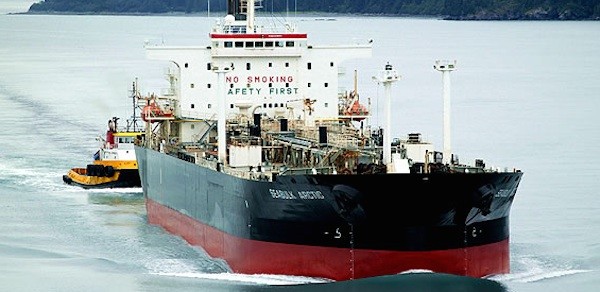Sinokor’s VLCC Blitz Sends U.S. Gulf Rates to Pandemic-Era Highs
A shipowner’s once-in-a-generation wager on oil tankers has made it so powerful that it controls an overwhelming majority of supertankers that can collect American oil next month.

Updated: August 11, 2014 (Originally published July 25, 2014)

NEW YORK, July 25 (Reuters) – Delta Air Lines Inc’s refining unit has chartered a U.S.-flagged oil tanker for the first time, allowing it to tap directly into cheap Texas shale oil as the company overhauls its supply strategy.
Monroe Energy LLC, the Delta subsidiary that runs the airline’s 165,000 barrel per day (bpd) Trainer refinery, has time-chartered the 330,000-barrel MR Seabulk Arctic, a Jones Act vessel built in 1998, for two years beginning in August, according to sources familiar with the deal. A Delta spokesman confirmed the charter but provided no further details.
It has an option to switch to a newly build ship in 2016 for an additional three years. Seabulk Tankers Inc, an indirect, wholly-owned subsidiary of SEACOR Holdings Inc that owns the Seabulk Arctic, has three tankers on order from General Dynamics’s NASSCO shipyard in San Diego, the first of which will be delivered in the fourth quarter of 2016.
The ship was previously chartered to leading U.S. refiner Valero Energy Corp, which sources say has moved to reduce its exposure to the Jones Act shipping market, a once-quiet niche that has surged in recent years on growing demand to ship Texas shale crude to East Coast refiners.
Monroe is paying upward of $80,000 per day for the Seabulk Arctic, a comparatively cheap rate that results from its age, higher fuel consumption and the longer duration of the contract. In contrast. Exxon Mobile Corp agreed to a record $120,000 a day charter in May.
After dropping the Seabulk Arctic charter, Valero will no longer have any domestic tonnage, sources said. A spokesman for Valero did not immediately reply to requests for comment.
TRADING OVERHAUL?
Ships moving between U.S. ports are required to be Jones Act compliant – U.S.-flagged, U.S.-built, and U.S.-crewed – making them about three times more expensive than international vessels.
Still, spot rates have doubled in three years as gushing shale wells in Texas depress Gulf Coast light crude prices, making the two-week journey to the East Coast more profitable than imports from the North Sea or Nigeria.
The Seabulk Arctic charter is the latest indication that Monroe is taking a new tack in its trading operations two years after Delta bought the Trainer plant, southwest of Philadelphia. At that time Delta sealed deals with BP and Phillips 66 to supply crude to the refinery and swap refined fuels for jet fuel.
On Thursday, however, Delta said in its quarterly filing that it had terminated the fuel-swap agreement with BP early, effective July 1, and replaced the oil major with another counterparty. It did not name the new party.
The SEC filing also made no mention of a three-year agreement with BP to supply Trainer with crude oil.
However, on Monday Monroe said that privately held midstream company Bridger LLC would supply 65,000 bpd of North Dakota Bakken crude to the Trainer refinery, largely by rail. (FACTBOX rail projects ).
While Monroe now has its own tanker for deliveries, this will not be the first time it is receiving Texas oil by ship.
Jones Act tankers Golden State and Florida have each made at least four trips from the Gulf Coast to the Trainer docks so far this year, according to Reuters shipping data. It was not clear whether all of those cargoes were destined for the Trainer refinery. (Reporting by Anna Louie Sussman; Editing by Steve Orlofsky)
This article contains reporting from Reuters, published under license.

Sign up for gCaptain’s newsletter and never miss an update

Subscribe to gCaptain Daily and stay informed with the latest global maritime and offshore news
Essential news coupled with the finest maritime content sourced from across the globe.
Sign Up